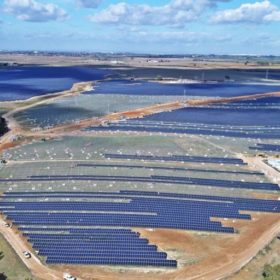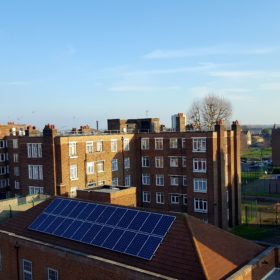Schneider Electric pulls out of utility-scale PV business
The French power electronics specialist is pulling out of the utility-scale segment to strengthen its profile in the residential and C&I space.
Solar creeps into chemical production with new nylon synthesis process
A team of researchers at NYU have presented a new chemical reactor type that synthesizes a precursor for nylon production through electrosynthesis, rather than a thermal based reaction.
BNEF: Cheap finance is key to PV deployment in the developing world
While solar is lauded as a cheap energy resource in OECD countries, the cost of financing PV projects in developing nations has impeded progress. Development banks and the Clean Technology Fund they finance have played a key role in providing access to cheap financing for clean energy projects in many markets.
European PV market grew 36% to reach 11 GW in 2018
Solarpower Europe has released its estimates for Europe’s installation figures in 2018. A reduction in system prices and a policy push boosted solar across the continent. And if the trade association’s CEO is to be believed, the newfound growth has just begun.
Eight trends for the PV industry in 2019
IHS Markit’s analysts have mapped out what they are keeping an eye out for in the year ahead. Aside from higher installation figures, the number-crunchers predict a continued battle for multi-function in the hard-fought inverter segment and a potential watershed year for utility-scale storage.
Bullish SolarEdge posts $100 million rise in gross profits and predicts strong start to 2019
Unimpressed by last year’s China policy-related shenanigans, the inverter maker continued to grow at a rapid pace as it acquired storage, uninterruptable power supply (UPS) and e-mobility related businesses. Its full-year results place SolarEdge in a good position going into a more promising year, with solar installations expected to hit double-digit growth figures in many markets and reach 120 GW globally.
IRENA presents its crash course in adopting renewables
The International Renewable Energy Agency has examined how common ground between sectors; digitalization; and technological innovation can transform the energy system and lower the cost of renewables. Storage technologies such as behind-the-meter applications, utility-scale storage and power-to-x are working in the right direction and much can be learned about digitalization from other sectors.
China to engineer a gigawatt-scale PV plant – in space
Plans were broadly sketched out in the nation’s twelfth five-year plan, in 2008. Since then China’s Defense Science and Technology Bureau has supported key technology research. An initial, megawatt-scale project is planned in the stratosphere sometime in the 2021-2025 period.
Centrica invests in Internet of Things startups and sees 4.5 GW flexibility potential in the UK
With its investment, the energy company has broadened its portfolio of ways to help customers save on energy bills. There are multiple energy companies pursuing similar goals at the moment as distributed generation and storage solutions require utilities to find new business models; not the least to avoid grid expansion costs.
Researchers upcycle plastic waste into battery anodes
A new approach could extract carbon from polyethylenes in a cost-competitive way, that could be scaled up. Researchers have also performed electric testing with the extracted carbon and found it suitable for use as anodes in Li-ion batteries, among multiple other uses.











